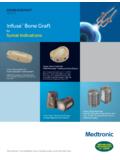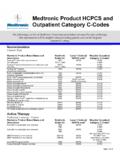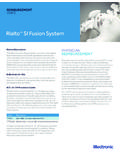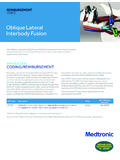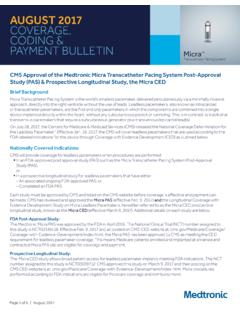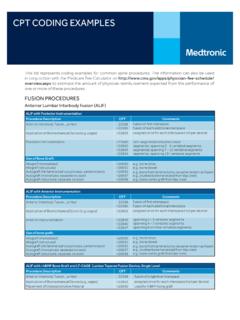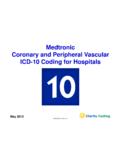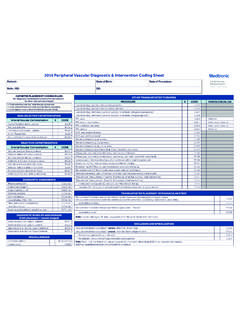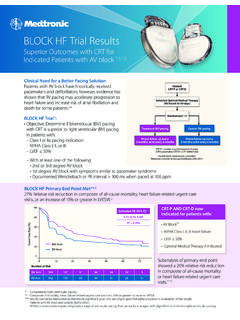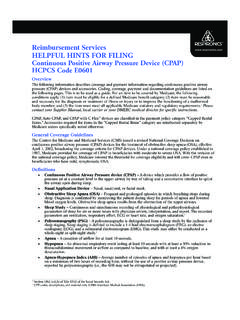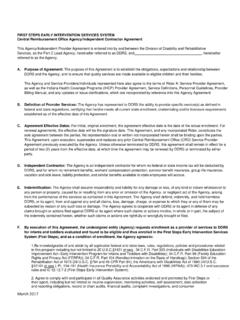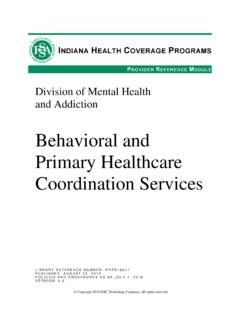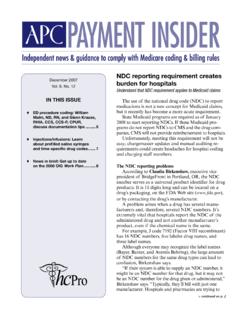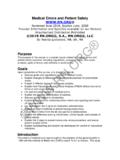Transcription of ALIGNING VALUE ACROSS THE HEALTHCARE …
1 Around the globe, governments, insurers, hospitals, physicians, and other caregivers are struggling to address unmet HEALTHCARE needs without further increasing costs or inhibiting economic growth. At Medtronic, we are committed to working with the health community to better leverage technologies and services that improve patient outcomes, integrate care delivery, and support the global shift toward VALUE -Based HEALTHCARE (VBHC). While the role of medical technology in VBHC is only beginning to be defined, and we re in the early stages of demonstrating how it can be applied, we re certain it can play a fundamental role in improving HEALTHCARE for century ago, the leading causes of death were infectious diseases such as the flu and pneumonia. During the ensuing decades, the development of vaccines, improved sanitation, greater public health awareness, and modern medicine helped reduce overall mortality by more than 50 percent while boosting life expectancy by 30 To address HEALTHCARE needs of modern society, we need a HEALTHCARE system that confronts our current HEALTHCARE challenges.
2 We are struggling to manage the leading causes of mortality globally heart disease, stroke, cancer, chronic respiratory diseases, and diabetes which account for 87 percent of all deaths in high-income At Medtronic, we believe that the technologies we create and the solutions we offer can play an important role in helping care organizations align VALUE , share accountability, and propel HEALTHCARE past the fragmented state that exists today. Instead of being set up to help patients with these chronic conditions get back to a high-quality life through proper, coordinated treatment, our systems are designed to best handle acute, episodic care and the cost and quality of that care can vary greatly. Our payment systems reward activity and function, not coordination and management, and this leads to billions of dollars in waste around the globe.
3 To make matters worse, patients with multiple chronic conditions consume a large percentage of HEALTHCARE dollars, thanks in large part to the overlap from this disjointed system. What HEALTHCARE needs desperately are therapies and care pathways for patients that deliver clinical and economic- VALUE and drive efficient, integrated care. This emphasis on fee-for- VALUE instead of fee-for-service can help better manage patient conditions, control costs, and continue to drive and reward innovations. These must be rigorously tested and rapidly applied in safe, effective ways to drive shared accountability for better patient results. At Medtronic, we believe that the technologies we create and the solutions we offer can play an important role in helping care organizations align VALUE , share accountability, and propel HEALTHCARE past the fragmented state that exists today.
4 THE NEED FOR A HEALTHCARE TRANSFORMATION HEALTHCARE costs, now at $948 per person a year globally, are According to a 2016 study by The Lancet, total global HEALTHCARE spend now exceeds $ This amount, about 10 percent of the world s gross domestic product, is climbing. For countries in the Organization for Economic Co-operation and Development, average public HEALTHCARE expenditure is projected to increase from percent of GDP in 2010 to 8 percent in 2060. Public long-term care expenditure is projected to increase from percent to percent of GDP in ALIGNING VALUE ACROSS THE HEALTHCARE ECOSYSTEM ALIGNING VALUE PERSPECTIVE 1 OF 4 $ trillion+total global HEALTHCARE spending4In the alone, costs reached roughly $3 trillion in 2014 and are expected to account for almost 20 percent of the country s GDP by 2024.
5 About one-third of that spending takes place in hospitals, demonstrating the need to make spending considerably more All of us can play a role in VALUE -Based HEALTHCARE way to reduce these costs is to rethink how and where we provide care. The best hospital bed is an empty one, said Don Berwick, former administrator of the Medicare and Medicaid programs. In the current fee-for-service models, he argues, hospitals aim for volume of care because this is how they stay profitable. But new rules and regulations are shifting payments toward a patient s overall health. That s important, because in an environment where chronic conditions are on the rise and patients with them need better care coordination, what should be rewarded is keeping a patient out of the hospital through preventative screenings, wellness plans, at-home care, and other measures that can improve outcomes and generate shared savings.
6 FACILITATING THE MOVE TO A VALUE -BASED FUTUREM edtronic supports efforts to drastically restructure HEALTHCARE delivery systems and make payment for products and services contingent upon the ability to improve patient outcomes relative to the cost. This shift is what many leaders and stakeholders mean when they discuss VALUE -Based HEALTHCARE . The attempts to move towards VALUE -based models are only in the early stages, and many systems, payers, and governments are just beginning to learn how to implement VALUE -based care models. However, key trends are emergingTo highlight best practices and facilitate implementation, Medtronic commissioned the Economist Intelligence Unit to conduct a first-of-its-kind research project looking at 25 countries and their status of adopting VALUE -Based HEALTHCARE .
7 The researchers brought together an international roster of independent HEALTHCARE experts to offer global perspectives and establish a unified framework that includes key indicators that make up the enabling environment for VALUE -based care. While it s clear from the findings that no one has all the answers yet the report, VALUE -Based HEALTHCARE : A Global Assessment, provides a valuable road map to be used by governments and HEALTHCARE systems to help define strategies and track progress towards VALUE -Based Michael Porter, a Harvard Business School professor, and Thomas Lee, chief medical officer at Press Ganey Associates, leading experts on VALUE -Based HEALTHCARE , describe the status of this shift, There is no longer any doubt about how to increase the VALUE of care.
8 The question is, which organizations will lead the way and how quickly can others follow? The challenge of becoming a VALUE -based organization should not be underestimated, given the entrenched interests and practices of many decades. 8 There is no longer any doubt about how to increase the VALUE of care. The question is, which organizations will lead the way and how quickly can others follow? VALUE -based efforts are starting to gain traction around the world. The International Consortium of Health Outcomes Measurement (ICHOM) has been working to better define outcome measurements in many of the most common disease conditions or episodes of care. These measures look beyond a procedure s immediate success toward longer-term measurements that include quality of life aspects of concern to patients.
9 They re working to publish standardized sets of outcomes ACROSS more than 50 percent of the global disease burden, with 23 already established for conditions such as atrial fibrillation, hypertension, and diabetes, with more in In the United States, the Medicare Access and CHIP Reauthorization Act (MACRA), a bipartisan law passed in 2015, continues to be implemented throughout the country by the Department of Health and Human Services. MACRA establishes a new framework for reimbursing physicians, rewarding the quality of care delivered by integrating performance-based protocols and alternative payment models to guarantee reimbursement is tied to successful patient results. Clearly, challenges remain, but Medtronic is committed to furthering VALUE -Based HEALTHCARE and partnering with like-minded organizations such as Harvard Business School, ICHOM, Boston Consulting Group, the Brookings Institution, Duke University, and the Centers for Medicare and Medicaid Services (CMS), to name a few to realize its potential.
10 We re confident that our focus on developing and deploying technologies, services and solutions will play a meaningful role in achieving the goals of this transformation. We have worked closely with HEALTHCARE leaders and ACROSS Europe, Asia, the Americas, and VALUE PERSPECTIVE 2 OF 4 expected to account for almost 20 percent of the GDP by 2024620%$3 HEALTHCARE costs in 20144 IMPROVING CARE EFFICIENCYW hile there is a consensus on moving to VALUE -based structures, governments, health insurers, employers, and hospital systems are still searching for methods that spur VALUE .
